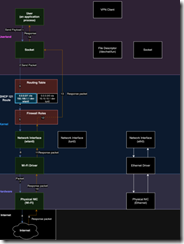VPNs, Snake Oil, and Privacy
July 2, 2024
 This essay is the work of a dinobaby. Unlike some folks, no smart software improved my native ineptness.
This essay is the work of a dinobaby. Unlike some folks, no smart software improved my native ineptness.
Earlier this year, I had occasion to meet a wild and crazy entrepreneur who told me that he had the next big thing in virtual private networks. I listened to the words and tried to convert the brightly-covered verbal storm into something I could understand. I failed. The VPN, as I recall the energizer bunny powered start up impresario needed to be reinvented.
Source: https://www.leviathansecurity.com/blog/tunnelvision
I knew that the individual’s knowledge of VPNs was — how shall I phrase it — limited. As an educational outreach, I forwarded to the person who wants to be really, really rich the article “Novel Attack against Virtually All VPN Apps Neuters Their Entire Purpose.” The write up focuses on an exploit which compromises the “secrecy” the VPN user desires. I hopes the serial entrepreneur notes this passage:
“The attacker can read, drop or modify the leaked traffic and the victim maintains their connection to both the VPN and the Internet.”
Technical know how is required, but the point is that VPNs are often designed to:
- Capture data about the VPN user and other quite interesting metadata. These data are then used either for marketing, search engine optimization, or simple information monitoring.
- A way to get from a VPN hungry customer a credit card which can be billed every month for a long, long time. The customer believes a VPN adds security when zipping around from Web site to online service. Ignorance is bliss, and these VPN customers are usually happy.
- A large-scale industrial operation which sells VPN services to repackagers who buy bulk VPN bandwidth and sell it high. The winner is the “enabler” or specialized hosting provider who delivers a vanilla VPN service on the cheap and ignores what the resellers say and do. At one of the law enforcement / intel conferences I attended I heard someone mention the name of an ISP in Romania. I think the name of this outfit was M247 or something similar. Is this a large scale VPN utility? I don’t know, but I may take a closer look because Romania is an interesting country with some interesting online influencers who are often in the news.
The write up includes quite a bit of technical detail. There is one interesting factoid that took care to highlight for the VPN oriented entrepreneur:
Interestingly, Android is the only operating system that fully immunizes VPN apps from the attack because it doesn’t implement option 121. For all other OSes, there are no complete fixes. When apps run on Linux there’s a setting that minimizes the effects, but even then TunnelVision can be used to exploit a side channel that can be used to de-anonymize destination traffic and perform targeted denial-of-service attacks. Network firewalls can also be configured to deny inbound and outbound traffic to and from the physical interface. This remedy is problematic for two reasons: (1) a VPN user connecting to an untrusted network has no ability to control the firewall and (2) it opens the same side channel present with the Linux mitigation. The most effective fixes are to run the VPN inside of a virtual machine whose network adapter isn’t in bridged mode or to connect the VPN to the Internet through the Wi-Fi network of a cellular device.
What’s this mean? In a nutshell, Google did something helpful. By design or by accident? I don’t know. You pick the option that matches your perception of the Android mobile operating system.
This passage includes one of those observations which could be helpful to the aspiring bad actor. Run the VPN inside of a virtual machine and connect to Internet via a Wi-Fi network or mobile cellular service.
Several observations are warranted:
- The idea of a “private network” is not new. A good question to pose is, “Is there a way to create a private network that cannot be detected using conventional traffic monitoring and sniffing tools? Could that be the next big thing for some online services designed for bad actors?
- The lack of knowledge about VPNs makes it possible for data harvesters and worse to offer free or low cost VPN service and bilk some customers out of their credit card data and money.
- Bad actors are — at some point — going to invest time, money, and programming resources in developing a method to leapfrog the venerable and vulnerable VPN. When that happens, excitement will ensue.
Net net: Is there a solution to VPN trickery? Sure, but that involves many moving parts. I am not holding my breath.
Stephen E Arnold, July 2, 2024



